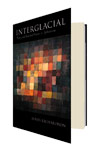In the famous opening sentence of his briefly stated medical principles—Life is short, art long, opportunity fleeting, experimenting dangerous, reasoning difficult—Hippocrates meant the art of medicine. To describe this new literary-scientific form he coined the term aphorism.
The aphorist positions him or herself as: (1) a sage able to contain worlds in a sentence or two; (2) a self-doubter not qualified to deliver a speech but only a sentence or two. And so it is a voice borne of an opposition. The sage risks pomp, the self-doubter editing his own content out of existence.
James Richardson became an academic and a poet by the usual means, but he is, by his own admission, an accidental aphorist. He regarded Vectors (2001), his book of five hundred aphorisms and “ten-second essays,” during its construction as “often… more as a questionable habit than as a book in progress.” The book became a cult favorite almost immediately.
The excitements of Interglacial: New and Selected Poems & Aphorisms, in reverse order, are: (1) that the lyric poems are so univocally quiet, wise, gloomy, and prosodically subtle; (2) that the aphorisms are so brilliant and deeply pleasurable; (3) that Richardson’s new poems, particularly the Half Measures, a hybrid of his best poetic and prosaic forms, seem to indicate that this poet has recently synthesized, in some laboratory setting, a designer hybrid form. Think glow-in-the-dark mice, but with letters and words.
The fascination of the book lies in the traceability of Richardson’s long, confident (and now practically copyrighted) prose line through the beginnings of his poetry career: Look at “The Encyclopedia of the Stones” (1977), from his first published collection of poems—not to mention lines and fragments that appear and then reappear decades later in Vectors or in the group of new aphorisms collected in Interglacial for the first time.
Second Guesses (1984), Richardson’s second book, moves one step closer to conventional (not an insult here) prose: “You get just one thing or the other— / where the water came from, or the water.” Suddenly aphorisms appear nested in the lyrics: “Each hour demands / a different happiness.” By As If (1992) the author has fully inhabited a hybrid form: “What’s a story, anyway, but desire beguiled? / I’m not a kid. I don’t expect to be satisfied.” Then, with Vectors...
You have reached your article limit
Sign up for a digital subscription and continue reading all new issues, plus our entire archives, for just $1.50/month.
Already a subscriber? Sign in





